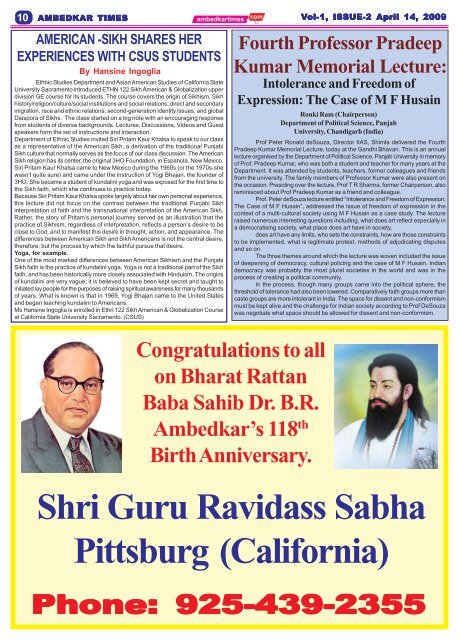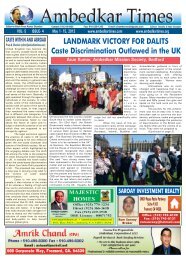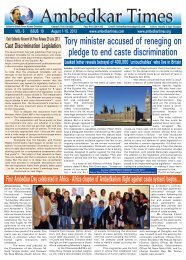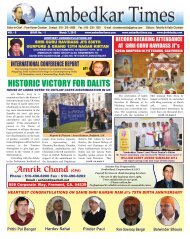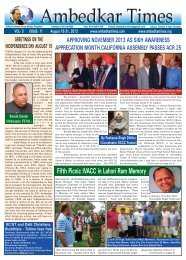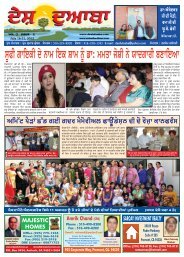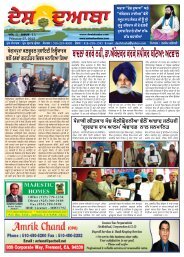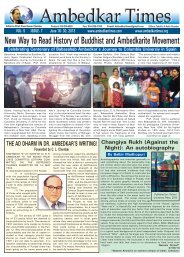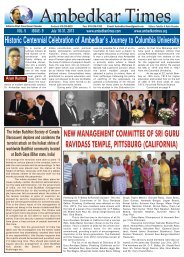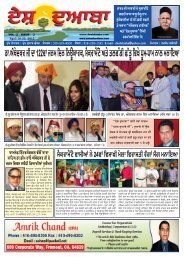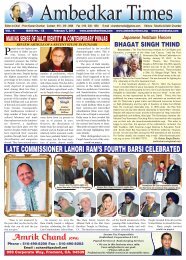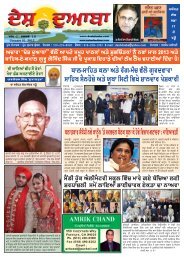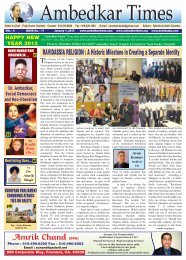ambedkar times news paper april 14, 2009 - Ambedkartimes.com
ambedkar times news paper april 14, 2009 - Ambedkartimes.com
ambedkar times news paper april 14, 2009 - Ambedkartimes.com
Create successful ePaper yourself
Turn your PDF publications into a flip-book with our unique Google optimized e-Paper software.
10<br />
AMBEDKAR AMBEDKAR AMBEDKAR TIMES TIMES<br />
TIMES<br />
Vol-1, ol-1, ol-1, ISSUE-2 ISSUE-2 ISSUE-2 April pril pril <strong>14</strong> <strong>14</strong> <strong>14</strong>, <strong>14</strong>, , , <strong>2009</strong><br />
<strong>2009</strong><br />
<strong>2009</strong><br />
AMERICAN -SIKH SHARES HER<br />
EXPERIENCES WITH CSUS STUDENTS<br />
By Hansine Ingoglia<br />
Ethnic Studies Department and Asian American Studies of California State<br />
University Sacramento introduced ETHN 122 Sikh American & Globalization upper<br />
division GE course for its students. The course covers the origin of Sikhism, Sikh<br />
history/religion/culture/social institutions and social relations, direct and secondary<br />
migration, race and ethnic relations, second-generation identity issues, and global<br />
Diaspora of Sikhs. The class started on a big note with an encouraging response<br />
from students of diverse backgrounds. Lectures, Discussions, Videos and Guest<br />
speakers form the set of instructions and interaction.<br />
Department of Ethnic Studies invited Siri Pritam Kaur Khalsa to speak to our class<br />
as a representative of the American Sikh, a derivation of the traditional Punjabi<br />
Sikh culture that normally serves as the focus of our class discussion. The American<br />
Sikh religion has its center, the original 3HO Foundation, in Espanola, New Mexico.<br />
Siri Pritam Kaur Khalsa came to New Mexico during the 1960s (or the 1970s-she<br />
wasn’t quite sure) and came under the instruction of Yogi Bhajan, the founder of<br />
3HO. She became a student of kundalini yoga and was exposed for the first time to<br />
the Sikh faith, which she continues to practice today.<br />
Because Siri Pritam Kaur Khalsa spoke largely about her own personal experience,<br />
this lecture did not focus on the contrast between the traditional Punjabi Sikh<br />
interpretation of faith and the transnational interpretation of the American Sikh.<br />
Rather, the story of Pritam’s personal journey served as an illustration that the<br />
practice of Sikhism, regardless of interpretation, reflects a person’s desire to be<br />
close to God, and to manifest this desire in thought, action, and appearance. The<br />
differences between American Sikh and Sikh Americans is not the central desire,<br />
therefore, but the process by which the faithful pursue that desire.<br />
Yoga, for example.<br />
One of the most marked differences between American Sikhism and the Punjabi<br />
Sikh faith is the practice of kundalini yoga. Yoga is not a traditional part of the Sikh<br />
faith, and has been historically more closely associated with Hinduism. The origins<br />
of kundalini are very vague; it is believed to have been kept secret and taught to<br />
initiated lay people for the purposes of raising spiritual awareness for many thousands<br />
of years. What is known is that in 1969, Yogi Bhajan came to the United States<br />
and began teaching kundalini to Americans.<br />
Ms Hansine Ingoglia is enrolled in Ethn 122 Sikh American & Globalization Course<br />
at California State University Sacramento. (CSUS)<br />
Congratulations to all<br />
on Bharat Rattan<br />
Baba Sahib Dr. B.R.<br />
Ambedkar’s 118 th<br />
Birth Anniversary.<br />
Fourth Professor Pradeep<br />
Kumar Memorial Lecture:<br />
Intolerance and Freedom of<br />
Expression: The Case of M F Husain<br />
Ronki Ram (Chairperson)<br />
Department of Political Science, Panjab<br />
University, Chandigarh (India)<br />
Prof Peter Ronald deSouza, Director IIAS, Shimla delivered the Fourth<br />
Pradeep Kumar Memorial Lecture, today at the Gandhi Bhavan. This is an annual<br />
lecture organised by the Department of Political Science, Panjab University in memory<br />
of Prof. Pradeep Kumar, who was both a student and teacher for many years at the<br />
Department. It was attended by students, teachers, former colleagues and friends<br />
from the university. The family members of Professor Kumar were also present on<br />
the occasion. Presiding over the lecture, Prof T R Sharma, former Chairperson, also<br />
reminisced about Prof Pradeep Kumar as a friend and colleague.<br />
Prof. Peter deSouza lecture entitled “Intolerance and Freedom of Expression:<br />
The Case of M F Husain”, addressed the issue of freedom of expression in the<br />
context of a multi-cultural society using M F Husain as a case study. The lecture<br />
raised numerous interesting questions including, what does art reflect especially in<br />
a democratising society, what place does art have in society,<br />
does art have any limits, who sets the constraints, how are those constraints<br />
to be implemented, what is legitimate protest, methods of adjudicating disputes<br />
and so on.<br />
The three themes around which the lecture was woven included the issue<br />
of deepening of democracy, cultural policing and the case of M F Husain. Indian<br />
democracy was probably the most plural societies in the world and was in the<br />
process of creating a political <strong>com</strong>munity.<br />
In the process, though many groups came into the political sphere, the<br />
threshold of tolerance had also been lowered. Comparatively faith groups more than<br />
caste groups are more intolerant in India. The space for dissent and non-conformism<br />
must be kept alive and the challenge for Indian society according to Prof DeSouza<br />
was negotiate what space should be allowed for dissent and non-conformism.<br />
Shri Guru Ravidass Sabha<br />
Pittsburg (California)<br />
Phone: Phone: 925-439-2355<br />
925-439-2355


